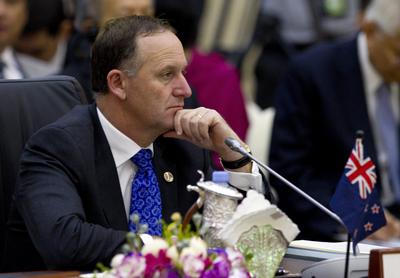New Zealand government decisions in 2013 gave priority to the contemporary over the historic, and to regional interests over nostalgia. Prime Minister John Key gave every indication of enjoying historical symbols, whether through tea with the queen at Balmoral Castle or basking in US approval, with soothing noises about a warming relationship with Washington. However, important decisions were consistent with New Zealand participation in East Asian integration. Good relations with the Chinese government contained problems with contamination in some New Zealand products. Ties with ASEAN were strengthened by ministerial visits to every member.
In the economic sphere, New Zealand pursued both Trans-Pacific Partnership (TPP) and Regional Comprehensive Economic Partnership (RCEP) negotiations. The TPP is far more prominent in public discussion and conventional journalistic sources. The TPP is easier to frame in familiar issues such as access to US dairy markets and Japanese agricultural markets, and attracts noisy ill-informed but opinionated activists to conventional political points-scoring.
Even at the analytical level, it is hard to avoid the impression that officials are more comfortable with the familiar trade-liberalisation terminology of the TPP than with the economic integration concepts in which RCEP is discussed, with emphasis on connectivity, inclusive growth, and narrowing development gaps. But there is recognition that RCEP addresses key regional and global trends in contemporary economic interdependence, and that New Zealand should participate in this — as it does when Asian leadership leads APEC in the same direction.
In one of the conventional journalistic reviews of political leaders at the end of 2013, Minister of Trade Tim Groser was described as absent from New Zealand political life. This reveals how far some journalists are from recognising the nature of contemporary New Zealand political life. The outcome of international processes is likely to be more important than the preoccupations of politicians in Wellington or Auckland. As the results of the 2013 census show,, more than a quarter of New Zealand residents were born overseas, and the homogeneous New Zealand population of the 1950s no longer exists. With the diaspora of New Zealanders resident overseas being proportionately larger than almost any other country, the idea of a small, self-contained country becomes increasingly absurd. But it will take a long time for public discussion to catch up.
There will be a general election in 2014 at which the present senior politicians will be seeking a third term in office.
The principal alternative to form government, the Labour Party, has changed its leader, discarding David Shearer for David Cunliffe. Most observers see this as having strengthened Labour’s challenge. So far, its spokesperson on international trade, Phil Goff, has maintained a bipartisan approach, including on the TPP (RCEP hardly figures in domestic politics). However, the Labour Party opposes the sale of public assets, raises inconclusively the possibility of reversing them, and offers support to those who seek to prohibit at least some overseas investment in New Zealand. Political debate does not deal in fine distinctions, or in changing facts, such as the modern nature of economic integration relative to old-fashioned market access agreements. Consequently, political debate will continue to confuse ‘trade’ and ‘investment’ and potential investors will be wary about political and regulatory uncertainty throughout 2014.
There will also be a similar debate about economic strategy in general. Economists are inclined to criticise the government for its lack of incisiveness. They can point to the timidity of assets sales policies; the caution taken in changes to labour market legislation; the resort to subsidies for the Tiwai Point electricity smelter and for the film industry; the refusal to address the key issue of the age of eligibility for age pensions in the face of an aging population; and tolerance for other questionable social policies, such as subsidies for students.
The first principles and rigour of the 1980s are a distant memory. (The electoral system was changed in the 1990s and ministers now generally have to negotiate for parliamentary majorities rather than assume as they could in the 1980s that parliament would approve their proposals. This alone means that first principles and rigour cannot be as dominant. But there is also less appetite for change.) On the other hand, leading political commentator, Colin James, has suggested that the government will eventually be recognised for implementing secure radical change, especially in areas like resource management and local governance. The Deputy Prime Minister and Minister of Finance Bill English has certainly followed a strategy of moving steadily and as fast as is consistent with mobilising public support. Business tends to look at the narrowness of parliamentary votes — a consequence of the mixed-member proportional representation system — and builds into its planning a likelihood of reversal with a swing of the electoral pendulum, but parliamentary votes may not reflect changes in public preferences.
If so, we can expect New Zealand in 2014 to remain a committed participant in Asian economic affairs.
Gary Hawke is an Associate Senior Fellow at the New Zealand Institute of Economic Research, and a member of the Academic Advisory Council of the Economic Research Institute for ASEAN and East Asia.
This article is a part of an EAF special feature series on 2013 in review and the year ahead.

